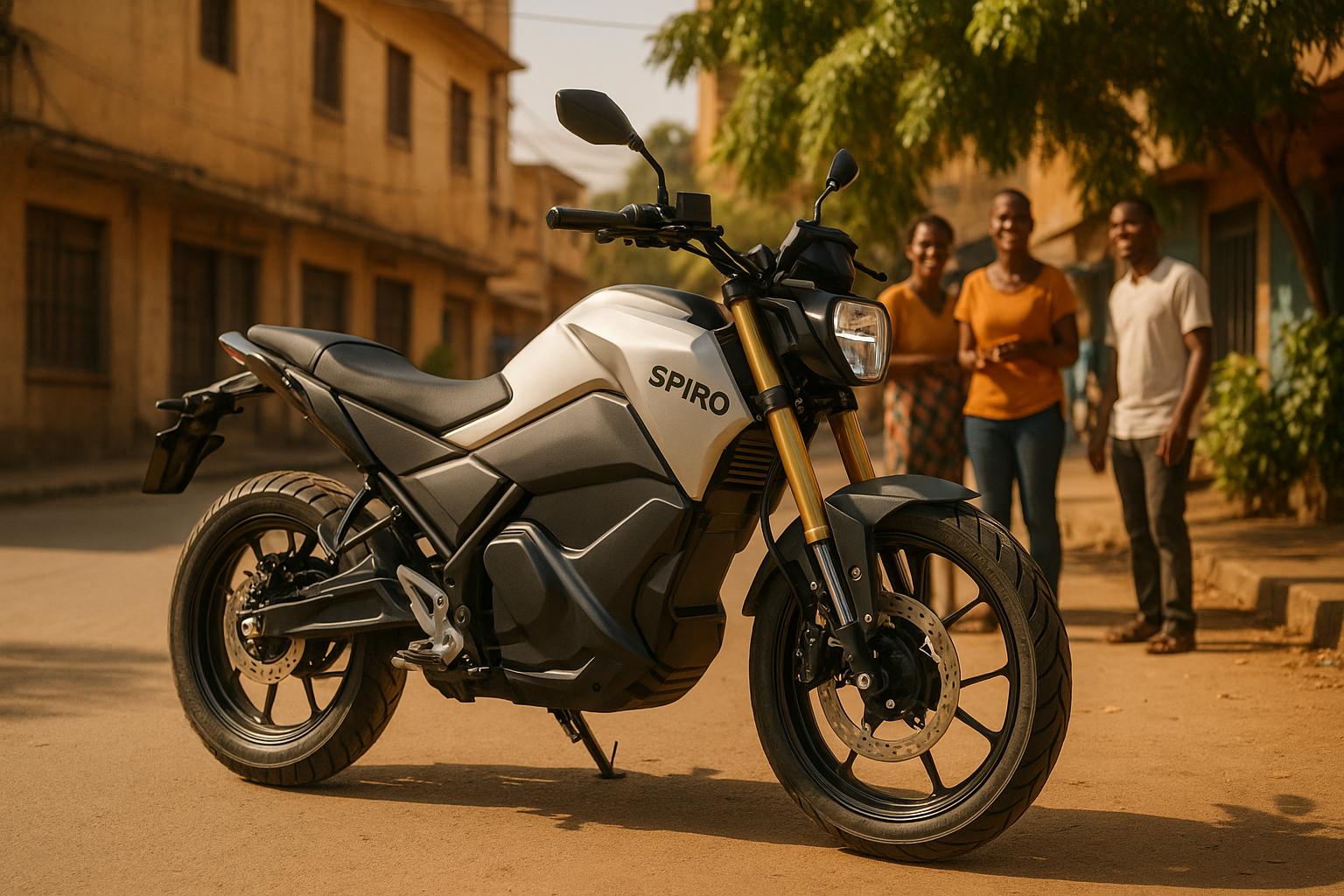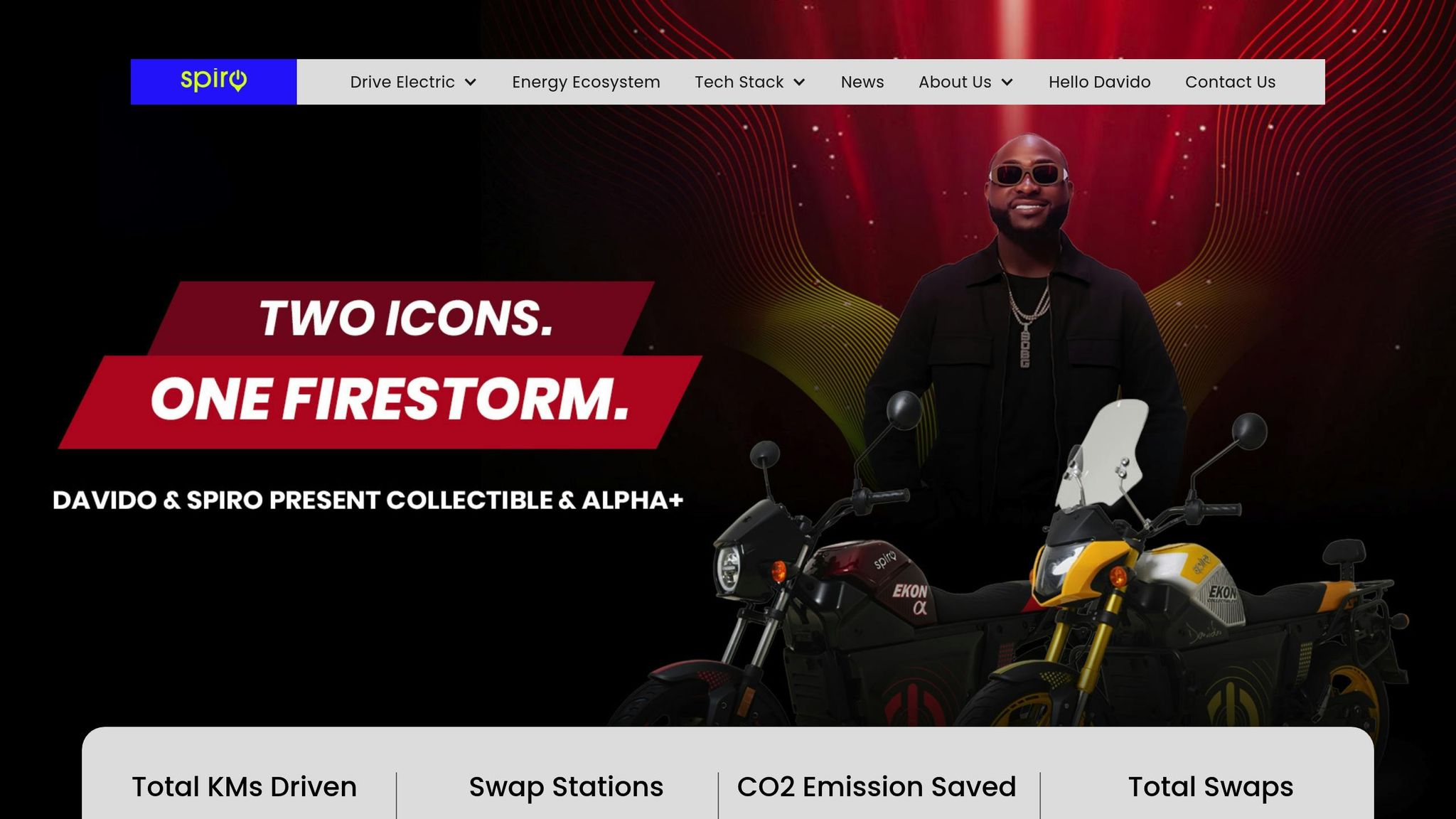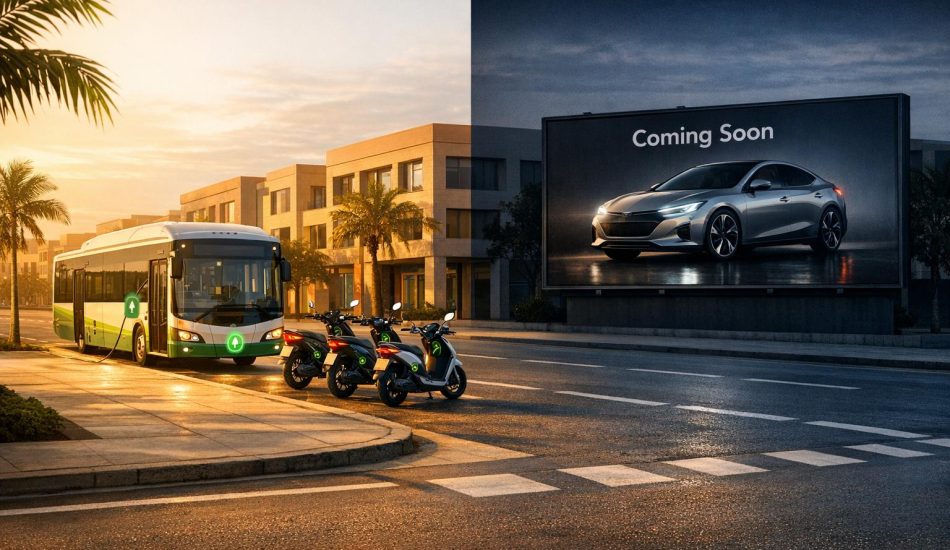
Spiro, a leader in electric motorcycles across Africa, has secured $63 million in funding to expand its operations. The company plans to deploy 2 million electric motorcycles by 2030, aiming to transform transportation and reduce emissions. Currently operating in eight countries with 22,000 bikes and 15 million battery swaps completed, Spiro‘s strategy includes:
- Adding 15,700 new electric bikes, 31,400 batteries, and over 1,000 battery swap stations.
- Opening assembly plants in Kenya and Nigeria in 2025 to lower costs and create jobs.
- Expanding into new markets like Cameroon, Benin, and Togo, targeting 400,000 riders.
Spiro’s battery-swapping technology ensures quick recharges in under a minute, cutting costs for riders by up to 50%. With over 32,000 tons of CO₂ already offset, the company is driving cleaner, more affordable urban mobility across Africa.
Funding Details and Expansion Plans
Investment Partners and How Funds Will Be Used
Spiro’s latest funding round, valued at $63 million, takes the form of a loan designed to maintain the company’s operational independence. This financial boost comes through a partnership with Société Générale and GuarantCo, two institutions deeply invested in advancing sustainable development across Africa. Their backing signals confidence in Spiro’s vision and operational strategy.
The funds are earmarked for several key initiatives. Spiro plans to acquire at least 15,700 new electric motorbikes to expand its fleet. Additionally, the investment will enable the deployment of over 31,400 electric batteries and the construction of more than 1,000 battery swap stations in its target regions. These efforts aim to address the infrastructure challenges that have slowed electric vehicle adoption on the continent.
Jules Samain, CEO of Spiro, highlighted the broader impact of this funding:
"This funding from GuarantCo and Societe Generale enables us to step up our commitment to decarbonise transportation. By adding at least 15,700 clean electric motorbikes, over 31,400 electric batteries and more than 1,000 swap stations to our existing fleet, we expect to significantly reduce greenhouse gas emissions. Furthermore, this venture allows us to generate numerous operational, maintenance, and technical support jobs, fostering local employment with a strong focus on gender inclusivity."
Beyond fleet expansion, the funds will also support Spiro’s manufacturing ambitions. The company is preparing to open assembly plants in Kenya and Nigeria by 2025. This move toward local production is expected to lower costs, create jobs, and further stimulate the local economies.
With this financial backing, Spiro is set to scale its operations and expand its footprint into new regions.
Expansion into New African Markets
The $63 million investment is also fueling Spiro’s push into untapped African markets. The company currently operates in eight countries: Kenya, Uganda, Tanzania, Rwanda, Nigeria, Benin, Togo, and Cameroon.
Benin and Togo are key focus areas for this phase of growth, with the funding aimed at reaching nearly 400,000 taxi-bike riders in these markets. Spiro’s strategy includes strategically placing battery swap stations every 3 kilometers in densely populated cities to maximize convenience and efficiency.
Cameroon is the newest addition to Spiro’s network. Operations officially began in May 2025 with a launch event in Douala, marking the company’s entry into the CEMAC economic zone. The initial rollout included 100 electric motorbikes and the setup of the first battery swap stations in the region.
Rahul Gaur, Managing Director of Spiro West Africa and Cameroon, emphasized the importance of this milestone:
"The launch of Spiro Cameroon is more than just opening a new office; it’s a statement of commitment to the people of Cameroon and their environment. We aspire to make Cameroon a regional model in green mobility."
Spiro’s growth plan also includes a phased approach to local manufacturing. Currently, the company operates four assembly plants in Kenya, Rwanda, Uganda, and Nigeria. In Cameroon, the next phase involves building a motorbike assembly plant, which will follow the successful deployment of the initial fleet.
Tanzania is another market where Spiro aims to establish or collaborate with local assembly facilities. This approach supports local economies while promoting job creation.
CEO Kaushik Burman underscored the company’s focus on affordability and accessibility:
"Spiro offers the most affordable bike and battery swapping network in Africa, with costs lower than gas-powered bikes. Our commitment is to provide accessible, eco-friendly transportation that transforms urban mobility and supports economic growth across the continent."
Spiro is also working to build a network of local component manufacturers, which will strengthen its supply chain and contribute to industrial development across Africa. The company’s operational achievements reflect its success: over 60,000 LFP batteries have been deployed, and more than 20 million battery swaps have been completed. In Kenya alone, Spiro introduced over 3,000 electric motorbikes in the 12 months leading up to June 2025, signaling strong market acceptance.
Battery Swapping Technology and Benefits
How Battery Swapping Works
Spiro’s battery swapping system is changing the way riders power their electric motorcycles by cutting out the need for long charging sessions. Instead, riders can swap out a drained battery for a fully charged one in under a minute. This is done at either manual or automated stations, with identity verification handled via a mobile app or RFID card.
The batteries are connected to a cloud-based system that monitors performance in real time, ensuring they operate efficiently and safely.
Samir Mishra, Spiro’s CTO, highlighted the sophistication of their system:
"Our automated swap stations, paired with Spiro batteries, set the highest standard for EV safety and quality. These stations are designed to offer our customers a seamless and secure experience, ensuring that every swap transparently conveys the exact value customers are paying for. The batteries are connected to the cloud around the clock making sure they meet the highest standards of performance and reliability."
By eliminating the need for extended charging times, this system is especially practical in areas with limited electricity access. It not only saves time but also brings cost and operational advantages to riders.
Benefits for Riders and Communities
The battery swapping system offers a reliable solution for uninterrupted operations, particularly for motorbike taxi drivers. With over 600 swapping stations across Africa and more than 20 million battery swaps completed, the system has proven its dependability.
One of the standout benefits is cost savings. Riders using Spiro’s electric motorcycles can potentially increase their profits by up to 50% compared to those using traditional fuel-powered bikes, thanks to reduced operational and maintenance costs.
The system also addresses range anxiety by providing a network of well-placed swap stations, ensuring riders can quickly access a fully charged battery whenever needed. Spiro’s subscription model, which includes battery swaps, insurance, and maintenance, often costs less than fueling a diesel-powered bike.
On the environmental side, Spiro’s operations have already prevented 32,796 tonnes of CO₂ emissions, leading to cleaner air in cities. With a target of 2 million bikes by 2030, these benefits are set to expand significantly.
This approach aligns with Spiro’s vision for scalable and sustainable transportation solutions across Africa.
Electric vs. Fuel-Powered Motorcycles Comparison
Spiro’s electric motorcycles offer clear advantages over traditional fuel-powered bikes:
| Aspect | Spiro Electric Motorcycles | Traditional Fuel-Powered Motorcycles |
|---|---|---|
| Refueling/Recharging Time | Less than 1 minute battery swap | Several minutes at a gas station |
| Operational Costs | 30–40% lower expenses | Higher fuel and maintenance costs |
| Carbon Emissions | Zero direct emissions | Continuous CO₂ and pollutant emissions |
| Maintenance Needs | Minimal due to fewer moving parts | Regular engine maintenance and oil changes |
| Range | 75–90 km per battery | Depends on fuel tank capacity |
| Profit Potential | Up to 50% higher profits | Lower profits due to fuel expenses |
| Infrastructure Requirements | Network of battery swap stations | Existing gas station network |
Spiro’s CEO, Kaushik Burman, sees fuel-powered motorcycles as the biggest obstacle to cleaner transportation. He remarked:
"We don’t see other EV players as our competition… It’s the gas-powered motorcycles that remain our biggest challenge."
Jules Samain, Spiro’s co-CEO, emphasized the environmental impact:
"Spiro’s electric bikes are a game-changer in the transition towards cleaner mobility. Unlike traditional ICE bikes, they emit zero carbon emissions, contributing to cleaner air and aligning with global efforts to fight climate change."
Spiro’s operational success further highlights the viability of this technology. In the first half of 2025 alone, the company completed over 15 million battery swaps and achieved an equipment stability rate exceeding 99%. With its blend of efficiency, affordability, and environmental benefits, battery swapping is proving to be a strong alternative to traditional fuel-powered transportation.
Economic and Climate Impact
Job Creation and Economic Opportunities
With $63 million in funding, Spiro is set to expand its operations across its four assembly plants in Kenya, Rwanda, Uganda, and Nigeria. The Kenyan facility alone is ramping up production from 50,000 motorcycles annually to 100,000, creating over 1,000 jobs in assembly, maintenance, and battery swap stations. Beyond that, Spiro’s network of more than 600 battery-swapping stations across eight African countries is generating additional roles in technical support and operations.
Kaushik Burman, CEO of Spiro, highlighted the importance of local manufacturing:
"These bikes are going to be made by Africans, in Africa, for the African terrains… We hope that this is going to be the start to what I say is an industrial transformation in Africa."
Spiro is also taking steps to promote gender equality within its workforce. The company aims to have at least 30% of its operational, maintenance, and technical roles filled by women. In March 2025, Spiro launched Africa’s first all-women electric vehicle assembly line in Kenya, a milestone underscoring this commitment. Additionally, Spiro Academy is equipping youth and women with training in EV maintenance, battery management, and diagnostics – skills that are increasingly essential as Africa embraces clean energy solutions.
The economic benefits of Spiro’s initiatives also extend directly to riders. Operators using Spiro’s electric motorcycles enjoy a lower total cost of ownership, allowing them to keep more of their earnings. For example, a female moto-taxi driver in Kigali, Rwanda, earns 15,000 Rwandan francs daily with her Spiro motorcycle. On top of that, the new Ekon electric motorcycle offers a 30% lower upfront cost compared to similar fuel-powered models.
Climate Benefits and Reduced Emissions
Spiro’s push for electric motorcycles isn’t just an economic win – it’s a major step toward reducing Africa’s carbon footprint. By 2030, the company plans to deploy 2 million electric motorcycles, a move that could significantly cut emissions. To date, Spiro’s fleet has already clocked over half a billion kilometers of CO₂-free travel across the continent. Each electric motorcycle reduces around two tons of CO₂ annually. Given that emissions from Africa’s transportation sector are growing at 7% per year, Spiro’s electric alternatives are a timely intervention.
The environmental impact of these efforts also brings public health advantages. Motor vehicle emissions account for about 90% of urban air pollution in Africa, contributing to an estimated 176,000 deaths annually, according to the World Health Organization. Transitioning to electric two- and three-wheelers could cut 500 to 600 tons of CO₂ emissions each year. This shift also reduces dependence on fossil fuel imports, keeping more economic benefits within local communities.
Supporting Local Communities
Spiro’s vision for transforming urban mobility is deeply rooted in empowering local communities. Through technology transfer, skills development, and strategic partnerships, the company is creating an ecosystem that supports sustainable growth. Its alignment with the UN Sustainable Development Goals – particularly in clean energy, sustainable cities, and climate action – further reflects its commitment to community-focused progress.
When Spiro entered Nigeria in April 2024, it partnered with local players like Max, Dot, and Onocon to ensure smooth integration into the market. Similarly, its expansion into Cameroon has involved close collaboration with local communities, institutions, and private sector stakeholders, creating hundreds of jobs in the process. By prioritizing local partnerships and skill-building initiatives, Spiro strengthens its dual focus on economic development and environmental sustainability.
Spiro’s collaborative approach plays a key role in advancing the electrification of Africa’s mobility sector. As stated in its mission:
"At Spiro, we are dedicated to enhancing livelihoods through sustainable energy by leading the large-scale electrification of mobility across Africa. We provide innovative, eco-friendly, affordable electric transportation solutions that transform urban mobility, reduce carbon emissions, and promote a cleaner environment. Driven by sustainability and innovation, our advanced battery-swapping technology ensures convenience and accessibility for all. Committed to community empowerment, we create jobs, foster local entrepreneurship, and support economic growth, paving the way for a greener, more prosperous future."
sbb-itb-99e19e3
Africa’s Electric Vehicle Market and EV24.africa‘s Role

Growth of Africa’s Electric Vehicle Market
The electric vehicle (EV) market in Africa is picking up speed, positioning the continent as a growing hub for sustainable transportation. By 2025, the market is expected to generate $209.9 million in revenue, climbing further to $314.1 million by 2029.
In 2024 alone, electric car sales nearly doubled, reaching 11,000 units, while two-wheeler sales rose by 40%, totaling 9,000 units. While these sales account for less than 1% of cars and about 0.5% of two-wheelers, the growth trajectory signals immense potential.
South Africa, for instance, recorded 3,042 New Energy Vehicle sales in the first quarter of 2024, an 83% jump compared to the same period in 2023, when 1,665 units were sold. Policy changes are also fueling this growth. Ethiopia, for example, implemented a ban on petrol and diesel car imports in 2024, leading to the deployment of 100,000 electric vehicles. As the International Energy Agency highlighted:
"Developments such as the ban on imports of petrol and diesel cars introduced in Ethiopia at the start of 2024 have resulted in a reported deployment of 100,000 electric vehicles."
Affordable EV models and local manufacturing efforts in countries like Nigeria, Togo, and Benin further bolster the market. In November 2023, Ford South Africa announced a $281 million investment in hybrid vehicle production. These initiatives, paired with assembly operations, are creating a solid foundation for the sector’s growth.
This evolving landscape provides fertile ground for platforms like EV24.africa to drive the transition to clean mobility across the continent.
How EV24.africa Supports Clean Mobility
Amid this rapid market expansion, EV24.africa is making electric vehicles more accessible throughout Africa. As companies like Spiro scale electric mobility solutions, EV24.africa complements these efforts by addressing critical infrastructure and access challenges.
The platform specializes in vehicles from top brands such as Tesla, BYD, Leapmotor, ROX, Dongfeng, Geely, Hyundai, Toyota, and Suzuki. Offering both new and used options, EV24.africa ensures delivery across all 54 African nations, breaking down barriers to EV adoption.
Rwanda offers a striking example of the platform’s impact. Between 2020 and 2024, the country’s electric vehicle market grew from just 19 vehicles to over 512. EV24.africa played a key role in this growth by importing models like the BYD Dolphin and Leapmotor T03. Today, Rwanda boasts 24 public charging stations and a growing network of battery swap facilities.
Since its launch, EV24.africa has received over 350 qualified vehicle requests from more than 30 African countries, underscoring the rising demand for electric mobility. The platform tackles common obstacles by providing transparent pricing, financing options, and robust after-sales support.
Younes Rabeh, Business Manager at EV24.africa, highlighted the platform’s achievements:
"In just three months, we’ve proven that the demand for electric mobility in Africa, and particularly in Rwanda, is not only real but accelerating. Our team is building more than a marketplace – we are laying the infrastructure and services to support Africa’s electric transition at scale."
Compact EVs, known for their faster return on investment and flexible charging options, are gaining popularity among African consumers. EV24.africa caters to these preferences, focusing on urban mobility, last-mile delivery, and fleet operations for businesses and governments.
Axel Peyriere, CEO and Co-Founder of AUTO24.africa and Africar Group, emphasized the strategic importance of EV24.africa:
"EV24.africa is a strategic move aligned with our mission to reshape mobility in Africa. Backed by Stellantis and built with a lean, digital-first approach, we are uniquely positioned to scale EV adoption across the continent and make sustainable transport a reality for all."
Beyond selling vehicles, EV24.africa provides a wide range of services, including charging infrastructure, fleet management tools, and expert car services. This comprehensive approach helps close gaps in infrastructure and support, enabling governments across Africa to implement favorable policies like tax breaks, subsidies, and investments in charging stations. By addressing these challenges, EV24.africa is playing a pivotal role in Africa’s shift toward a cleaner, more sustainable future.
Spiro signs $63 million debt financing deal to speed electric vehicle development in Africa

Conclusion: Spiro’s Path to 2030
Spiro’s $63 million funding marks a major step forward in reshaping Africa’s transportation landscape. With more than 33,000 electric motorbikes already on the roads across several African nations and over 600 battery swapping stations in operation, the company has laid a strong foundation for its ambitious goal: reaching 2 million electric bikes by 2030. Strategic partnerships and well-planned expansions are turning this vision into a tangible reality.
Key agreements highlight the momentum behind Spiro’s mission. In Uganda, plans are underway to deploy 140,000 bikes and establish 3,000 battery swap stations. Meanwhile, partnerships with Société Générale and GuarantCo will bring 15,700 bikes, 31,400 batteries, and over 1,000 swap stations to Benin and Togo. These alliances not only reflect confidence in Spiro’s vision but also underscore the broader impact of its work.
Spiro’s CEO, Jules Samain, captured the essence of this mission:
"This pivotal partnership with Societe Generale and GuarantCo has accelerated our mission to tackle climate change, enhance public health, and empower Africa’s economies. By expanding our e-mobility footprint in Benin and Togo, we’re making significant strides in reducing greenhouse gases. This isn’t just about electric motorbikes; it is about envisioning a sustainable future for Africa and stimulating socio-economic growth through job creation and gender-inclusive employment. This alliance brings us a step closer to our goals, signalling transformative changes for Benin, Togo and beyond."
Spiro’s achievements so far are impressive: over half a billion kilometers of CO₂-free travel and more than 20 million battery swaps. Riders have also seen tangible benefits, with fuel costs reduced by 35% and maintenance costs by 40%.
Looking ahead, Spiro plans to expand its footprint to at least 10 African countries by 2030. Upcoming manufacturing facilities in Uganda, Kenya, Nigeria, and Rwanda will support this growth while bolstering local economies and reducing reliance on fossil fuel-based imports.
This progress is unfolding within a broader ecosystem that supports sustainable mobility. For example, EV24.africa is working to improve EV accessibility across all 54 African nations by addressing infrastructure challenges and offering comprehensive support services. These combined efforts are accelerating Africa’s shift toward cleaner, more sustainable transportation solutions.
Spiro’s journey to 2 million electric bikes by 2030 is much more than just a growth story. It’s a movement toward affordable, environmentally friendly transportation that strengthens communities and supports local economies. With strong financial backing, government partnerships, and a proven model, Spiro is poised to lead the charge in Africa’s electric mobility revolution.
FAQs
What is Spiro’s battery-swapping technology, and how does it benefit riders?
Spiro’s battery-swapping system makes life easier for electric motorcycle riders by offering a quick and hassle-free way to stay powered up. Instead of waiting hours for a charge, riders can simply swap their empty battery for a fully charged one within minutes at designated swap stations. These stations are thoughtfully located to be easily accessible, cutting down on downtime.
This approach comes with some major perks. First, it saves time – no more long charging waits. Second, it eases range anxiety, letting riders cover longer distances without stressing over battery life. And finally, it helps cut costs, making electric motorcycles a more budget-friendly and convenient option for eco-conscious riders.
How will Spiro’s expansion in Africa benefit local economies and create jobs?
Spiro’s entry into African markets is poised to bring substantial benefits to local economies and job opportunities. By ramping up the production and distribution of electric motorcycles, the company will spark demand across industries like manufacturing, assembly, and maintenance – generating thousands of jobs tied to clean energy while encouraging economic diversification.
This growth will also bolster local industries by decreasing dependence on imports and encouraging more sustainable practices. Through its focus on renewable energy and forward-thinking solutions, Spiro aims to support lasting economic progress while tackling environmental issues in the region.
How is Spiro tackling the infrastructure challenges of electric vehicle adoption in Africa?
Spiro is tackling infrastructure hurdles head-on by establishing a growing network of battery swap stations, with more than 100 already up and running in Kenya and Rwanda. These stations let riders quickly exchange or recharge batteries, cutting down on waiting times and boosting convenience.
The company is also focusing on extending charging infrastructure into rural areas, aiming to bring electric motorcycles to regions with varying landscapes. This initiative addresses energy access challenges in underserved areas, paving the way for dependable and eco-friendly transportation across Africa.




